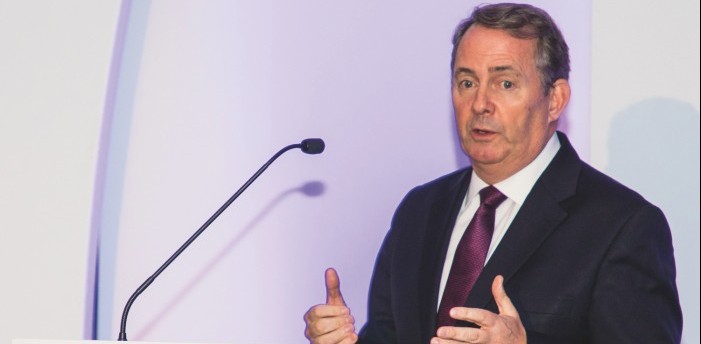Trade and Industry Secretary Liam Fox has admitted UK farming could face the post-Brexit nightmare scenario of debilitating export tariffs, while the UK Government waives import tariffs.
The prospects of the Government securing a deal before we leave the EU remain clouded in doubt, with mixed messages bring reported on progress on the sticking point of the Irish border and the prospects of a November agreement.
A no deal would have huge implications for the pig sector, including tariffs on pork exports to the EU from day one. The International Meat Trade Association (IMTA) has estimated these would increase pork export costs, averaged across the various cuts, by 43%.
But speaking at a recent AHDB export conference, Dr Fox said the UK could opt to keep its tariffs low, a move that would help stave off rising food prices. The UK could ‘apply unilaterally whatever tariffs we wanted’ on imports, he said.
“We could maintain our level of applied tariff or we could decide to bring tariffs down. Effectively, you could have unilateral tariff liberalisation – that would be a political decision. It is legally possible.”
He said it was also ‘technically possible’ for tariffs to be waived both ways in the event of a no deal, but added that ‘our decision would not necessarily be matched by them’.
He stressed that the UK wanted a deal that maintained zero tariffs both ways, something he said was in the EU’s interest, given it has £80-90bn trade in goods surplus with the UK. Tariffs would mean the EU27 paying about £14bn a year to access UK market, while the UK pays about £6.9bn the other way.
“I hope we never have to make that decision, but we are considering what all our options might be in a no deal, including day one tariffs,” he said.
NPA senior policy advisor Ed Barker said a no deal could be the ‘worst of all worlds for the pig sector’ if the UK and EU-27 adopted different approaches to tariffs. “This would make our exports, including cull sows largely uncompetitive, but EU imports would continue to flood in. We must have equivalence,” he said.
Fears of huge disruption in event of ‘no deal’ Brexit
Tariffs are not the only concern for the pig industry in the event of a ‘no deal’.
In a no deal scenario, no animals or animal products will be able to be exported to the EU until the UK has been ‘listed’ as a third country, a process that could take around six months. Defra Secretary of Michael Gove told a House of Lords committee there is a possibility the EU may agree to a ‘fast-track’ approach allowing exports to resume in 5 days, but said there is no guarantee of this approach being agreed.
There are also fears of huge delays at ports as a new regime of veterinary checks and export certificates would apply on meat trade in food products at Border Inspection Posts (BIP).
Mr Gove said what happens at ports was one of his biggest concerns in the event of a no deal. One-fifth of the UK’s exports go via the Dover Straights and the Eurotunnel to Calais, but there is no BIP at Calais, so all animal and animal exports will have to be re-routed, for example to Rotterdam, with serious implications for UK road traffic and for capacity at other ports
There are also concerns about whether there will be enough vets available to undergo the necessary border checks and process the certificates. This problem would be exacerbated if EU vets end up having to leave the UK, which would also have enormous implications for meat hygiene inspections, which are heavily reliant on EU vets.
The prospect of disruption to supplies of some veterinary medicines, particularly vaccines, as 100% regulatory compliance would be difficult achieve by day one, was raised at a National Office of Animal Health conference, in London. But there is still time to resolve the problems, one speaker said.
The NFU said a no deal would be the ‘worst possible outcome’ for the industry’. President Minette Batters said: “The potential of leaving without a deal is unthinkable for British farming.”




